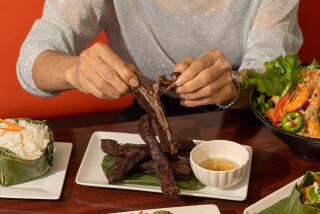Khmer Rouge Leader Arrives in Phnom Penh : Cambodia: Sihanouk, meanwhile, denounces the guerrilla group and says its leaders should be tried for war crimes.
- Share via
PHNOM PENH, Cambodia — A leader of the hated Khmer Rouge, Cambodia’s former rulers who were blamed for the deaths of more than 1 million Cambodians in the 1970s, returned to Phnom Penh today to take part in a coalition government.
Son Sen, who during the Khmer Rouge’s brutal rule from 1975 to 1979 served as defense minister and chief of security, arrived on a flight from Bangkok, Thailand, and was met in a closed room by government officials. He was driven away with a police escort to a hotel.
“I am happy to come back,” Son Sen told reporters. An aide explained that the guerrilla leader feels secure in returning because last month’s Paris peace accord on Cambodia set the stage for “national reconciliation.”
In contrast to the thousands of people who greeted Prince Norodom Sihanouk, the leader of the coalition, when he returned to his homeland Thursday, only a few curious onlookers climbed a white metal fence at Pochetong Airport to catch a glimpse of Son Sen. He was accompanied by half a dozen aides.
Along with Pol Pot, Ieng Sary and Ta Mok, Son Sen is regarded by many Cambodians as one of the worst offenders of human rights during the brutality of the Khmer Rouge years. As security chief, he was directly responsible for the infamous Tuol Sleng Prison, where thousands of people were tortured to death.
Ironically, Son Sen has returned to work out security concerns for the Khmer Rouge, who have complained that they feel threatened in the capital where so many died. The Phnom Penh government has ruled that each Khmer Rouge leader will be allowed only 10 bodyguards and that further security will be provided by government troops.
Under a peace agreement signed in Paris last month, Son Sen and the leader of the Khmer Rouge, Khieu Samphan, are taking part in a 12-member coalition government called the Supreme National Council, which will govern Cambodia until free elections for a national assembly can be held. In the meantime, the United Nations will supervise a cease-fire and help administer the country.
At a mass rally on Saturday, Sihanouk denounced the Khmer Rouge and said he believes its leadership should be placed on trial for war crimes. But he said a final decision on whether to hold a genocide tribunal should be left to a new government chosen in free elections.
At his first news conference since returning to the country, a jovial Sihanouk also announced the formation of a political coalition between the ruling Cambodian People’s Party and the Sihanouk political party, which is headed by his son, Prince Norodom Ranariddh.
Sihanouk, who is the president of a four-party coalition government and who has pledged to remain neutral, nevertheless predicted that the alliance between Phnom Penh and Ranariddh would win the popular election expected in about two years.
The formation of the political alliance follows an amazing transformation in Sihanouk’s relations with the Phnom Penh regime headed by Premier Hun Sen.
Until this fall, Sihanouk headed a three-group guerrilla coalition that since 1979 had sought to oust the Phnom Penh regime because it was installed after a Vietnamese invasion. But on his return Thursday, Sihanouk drove through the streets of Phnom Penh with Hun Sen at his side.
Sihanouk said the recently renamed People’s Party, which had been the ruling Communist Party, had “achieved many positive and beneficial things for Cambodia.”
Among them, he listed the recognition by the state of Buddhism as an official religion, the government’s efforts to care for the people by distributing land, the liberalization of the economy and the acceptance of a multi-party system and liberal democracy.
While Sihanouk said he had entered into a marriage of convenience with the Khmer Rouge against the Phnom Penh regime, he told the crowd of 25,000 people in front of his palace Saturday that the past is “unforgettable” and that he is “100% in support” of calls for a war crimes tribunal to try the leadership of the Khmer Rouge.
He drew a laugh from the crowd when he said he had become skinny during the Khmer Rouge’s rule of Cambodia, when he was kept a virtual prisoner in his palace. The joke was a form of black humor, since the pudgy prince lived far better than most of those who survived the Khmer Rouge experience, many of whom even today are skeletal in their appearance.
Sihanouk brought a hush to the crowd when he described how five of his children and 14 of his grandchildren had been murdered by the Khmer Rouge, who beat them against trees on the grounds of the palace.
“It’s unforgettable,” he said. “This disease remains hidden in my body.”
More to Read
Sign up for Essential California
The most important California stories and recommendations in your inbox every morning.
You may occasionally receive promotional content from the Los Angeles Times.













